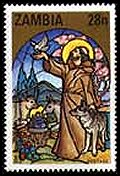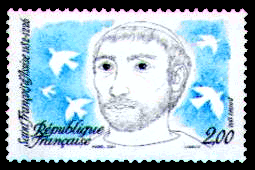St. Francis of Assisi (1181-1226) is one of the patron saints of Scouting because he shared with Scouts their love of the outdoors, the creatures of the earth, even the sky, wind, water and fire. Brother Sun, Sister Moon is the title of a movie produced many years ago, based on the life of St. Francis. He founded the Franciscan Order.
St. Francis, who lived in Italy, loved nature because he constantly saw the hand of God in the creating and the sustaining of nature. This led him to see goodness where many people saw serious evil.

Zambia issued stamps of four different denominations in 1980 showing a stained glass window from Nodola Church of St. Francis and the crib at Greccio. He is surrounded by animals, including a wolf.
The best illustration of this is the story of the wolf of Gubbio. Gubbio is an Italian town where people had been terrorized by a large wolf which preyed upon other animals and sometimes on humans. The beast was too fierce and aggressive for people to control or kill. When Francis came to Gubbio he told people he would tame the wolf. They implored him not to try. He took one companion with him and headed for the area where the wolf was. Suddenly the wolf came charging, mouth open, teeth bared, going for the kill. But Francis, the wolf’s target, did not run away or cringe with fear. He stood his ground.
As Francis raised his arm and made the Sign of the Cross, the wolf slowed down to a walk or a crawl and listened. Francis said: “Come to me, Brother Wolf. In the name of Christ, I order you not to hurt me or anyone.”
No one had ever spoken to the wolf with the kindly authority of Francis. The animal lay down peacefully at the feet of Francis and listened as the saint recited terms of peace which the wolf and the citizens of the town were to accept, namely that the wolf would never attack anyone again, and people of the town would take turns feeding the wolf. These terms Francis somehow managed to make the wolf understand and accept.
Francis then walked into Gubbio with the wolf by his side like a pet dog. In the town Francis made the people promise to feed the wolf. Never again did the wolf attack anyone nor did the people neglect to feed the wolf. This “peace treaty” was kept during the two remaining years of the wolf's life. The people mourned his passing.

France issued a stamp in 1982 with a simple drawing of St. Francis with a background of doves.
St. Francis preached to any crowds that listened to him. On at least one occasion an outdoor sermon of his was drowned out by noisy creatures. Countless swallows busy building their nests were creating an uproar of chattering.
So Francis turned to the birds and said: “My sisters, the swallows, it is now time for me to speak too, because you have been speaking enough all this time. Listen to the Word of God until the sermon is finished.”
Two things happened: The birds stopped their chatter and the people of the audience recognized the holiness of the speaker and remained silent and attentive along with the birds.
The hymn “All Creatures of Our God and King,” found in various hymnals, was written by St. Francis and sums up his love for creation. Creation listed in the hymn includes earth sun, moon, wind, clouds, flowing water, fire, warmth, light, flowers, and fruits. But the phrase “all creatures” must include fish, birds, animals wild and tame, reptiles, and insects, which all figure in the life of St. Francis.
The Scout Handbook, explaining the sixth point of the Scout Law — “A Scout Is Kind” — has this to say: “A Scout knows there is strength in being gentle. He treats others as he wants to be treated. Without a good reason he does not harm or kill any living thing.” St. Francis would accept these statements but would add that his gentleness and protection of living things is motivated by love for God, who made all these creatures and loves them.
This article was reproduced from the Dec. 7, 2000 edition of the Inland Register, The Roman Catholic Diocese of Spokane.


